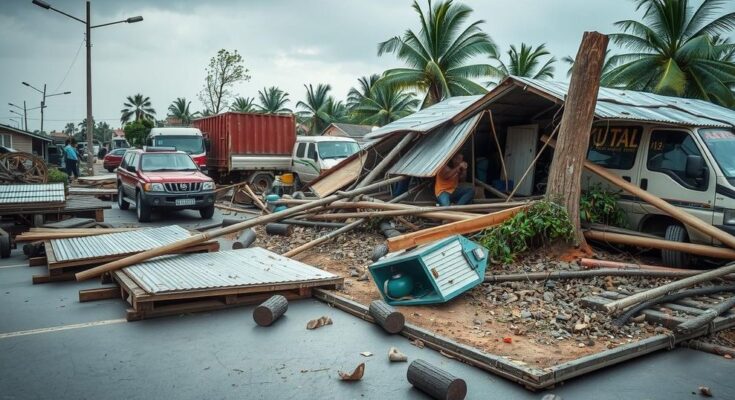Tropical Cyclone Chido has devastated communities in Mozambique, affecting approximately 453,971 individuals, resulting in severe property destruction, fatalities, and injuries. Significant damages include over 70,000 homes and hundreds of schools and health centers. With an existing cholera outbreak and rising humanitarian needs, urgent assistance is required to support recovery efforts and prevent further health crises.
Mozambique is currently facing a humanitarian crisis as a direct result of Tropical Cyclone Chido, which made landfall on December 15, 2024, unleashing torrential rains exceeding 250 mm within a short span of 24 hours and winds reaching up to 120 km/h. The cyclone has heavily impacted various communities, with initial estimates indicating that approximately 453,971 individuals have been affected, leading to 120 fatalities and numerous injuries. An extensive assessment revealed catastrophic damage, particularly in Cabo Delgado Province, where almost all structures were destroyed in some districts.
The scale of destruction encompasses over 70,000 homes, 250 schools, and 52 health facilities. The need for immediate humanitarian assistance is critical, particularly due to concurrent challenges such as a cholera outbreak in nearby regions. Many communities rely on unstable makeshift shelters, which have proven inadequate against the cyclone’s ferocity.
In Nampula Province and surrounding areas, thousands of individuals require essentials including food, clean water, and health services. The cyclone’s devastation not only obstructs access to vital services but also complicates the evacuation of patients and delivery of necessary supplies due to damaged infrastructure. Despite proactive measures by local authorities and NGOs, the immediate humanitarian needs greatly exceed the current response capacity.
Furthermore, displaced persons already fleeing violence from non-state armed groups now find themselves facing additional adversity. The loss of livelihoods and housing necessitates urgent interventions aimed at providing shelters, agricultural assistance, and mental health support. Issues related to protection and gender-based violence are also emerging as prominent concerns, requiring collaborative efforts to address these risks.
Amidst these compounded crises, urgent funding is needed to sustain ongoing recovery efforts and assist individuals left vulnerable by Cyclone Chido. This cyclone disaster has exacerbated existing hardships stemming from previous conflicts and natural disasters. The humanitarian community has mobilized some resources, but additional contributions are essential to adequately address the escalating needs.
Cyclone Chido struck Mozambique, causing significant disruption and devastation just as communities were still recovering from previous crises. On December 15, the cyclone led to extensive flooding and property destruction across multiple provinces, severely affecting infrastructure and local populations. Given the region’s vulnerability to natural disasters and existing socio-economic challenges, the implications of Cyclone Chido extend beyond immediate physical destruction to include public health emergencies and increased risks for displaced populations. As assessments continue to reveal the extent of the damage, humanitarian organizations face the challenge of mobilizing adequate resources to respond effectively. The situation is further complicated by a cholera outbreak in the vicinity, calling for a decisive response to avoid exacerbating already high mortality rates.
In summary, the effects of Tropical Cyclone Chido have precipitated a significant humanitarian crisis in Mozambique, with widespread devastation and increasing pressure on already strained resources. Immediate action is paramount to address the urgent needs of the affected populations, restore basic services, and provide long-term recovery assistance. Collaboration among local authorities, NGOs, and international organizations will be essential to navigate this crisis effectively and minimize further human suffering. The call for additional funding underscores the pressing nature of this disaster amidst several concurrent challenges.
Original Source: www.unocha.org




